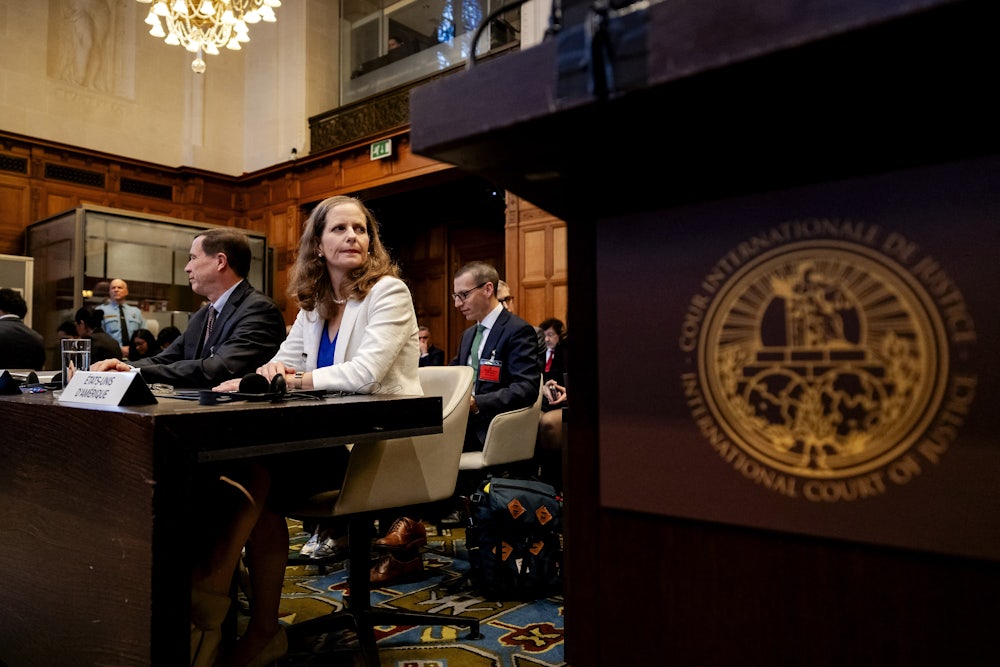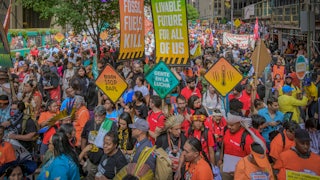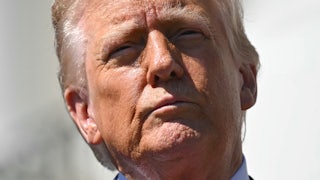The United States is looking to shoot down a case being heard in front of the International Court of Justice, or ICJ. No, it’s not the one launched late last year by South Africa, arguing that Israel is committing genocide—although the White House also opposes that one. This case is being championed by Vanuatu and other climate-vulnerable Pacific island states. At their urging, the U.N. General Assembly last March asked the ICJ to deliver its opinion on two questions: whether international law obligates governments to protect the earth’s climate system from greenhouse gases and what the “legal consequences” are should they fail to do so, causing “significant harm.” Hearings began on Monday.
The U.S. has made its answers to the case’s central questions clear: No, governments do not have an obligation to protect the earth’s climate. And there should be no legal consequences for doing the opposite. State Department legal adviser Margaret L. Taylor contended before the court this week that the U.N. Framework Convention on Climate Change, or UNFCCC, which oversees the Paris Agreement, is “the only international legal regime specifically designed by states to address climate change.” States are under no legal obligation to meet the climate targets they set for themselves in these processes. Accordingly, the U.S. argues, countries have no enforceable, legal obligation to reduce their emissions. She also argued that advisory proceedings like this one are “not the means to litigate whether individual states or groups of states have violated obligations pertaining to climate change in the past or bear responsibility for reparations.”
While the Biden administration claims to protect the so-called “rules-based international order,” it has a contentious relationship with the bodies that decide who breaks those rules. In January, the ICJ found it plausible that Israel could be violating Palestinian rights under the Genocide Convention, i.e., committing genocide; U.S. officials have called the claims in that case “meritless.” The U.S. has similarly criticized the court’s opinion that Israel’s occupation of Palestinian territories violates international law. When the International Criminal Court announced in May that it was issuing arrest warrants for Israeli Prime Minister Benjamin Netanyahu and now former Defense Minister Yoav Gallant, Biden denounced the decision as “outrageous.” Secretary of State Antony Blinken suggested that his administration might work with Congress to impose sanctions on the ICC in response.
America’s case for climate impunity is more subtle, legalistic, and widely shared—at least among other major greenhouse gas emitters. A 97-page written statement to the ICJ notes, among several other arguments, that human rights law doesn’t state that countries have to protect humans from global warming, the effects of which could threaten their rights. “A recognition that anthropogenic climate change can adversely affect the enjoyment of human rights,” the U.S. argues, “does not mean that States have international human rights obligations to mitigate anthropogenic [greenhouse gas] emissions.”
The case has been the site of rare agreement between the U.S. and China, the world’s two largest polluters, whose relationship has deteriorated significantly in recent years amid trade disputes. Both joined other major polluters—including Saudi Arabia and Australia—in arguing that U.N. climate change negotiations “provide the basis for states’ legal obligations to fight global warming and address the consequences of their historic contributions,” as China’s representative to the ICJ noted in comments to that body. These polluters posit the UNFCCC as the best possible tool for handling the climate crisis, urging the world to stick with a status quo that smaller, climate-vulnerable countries argue leaves them behind. Ralph Regenvanu, Vanuatu’s special envoy for climate change and environment, said in a statement Wednesday that the U.S., China, Saudi Arabia, and Australia this week “have pointed to existing treaties and commitments that have regrettably failed to motivate substantial reductions in emissions.” A decision in the case isn’t expected until at least next summer. Though not legally binding, it could set a precedent for future climate-related litigation.
Even as Trump threatens to re-withdraw the U.S. from the Paris Agreement—and potentially even from the UNFCCC—the Biden administration continues to fight its own technocratic battles against any agreements that might hold it legally responsible for reducing emissions. It also continues to oppose providing adequate financing to countries to mitigate, adapt to, and recover from climate change. There’s a world of difference between where Trump and Biden stand on the issue of climate change, of course; it’s hard to imagine the Trump administration bragging about having “vigorously pursued climate action, both domestically and internationally,” as the U.S. did in its statement to the ICJ. When it comes to questions of accountability, though—for climate change or genocide—they’ve got plenty of common ground.








